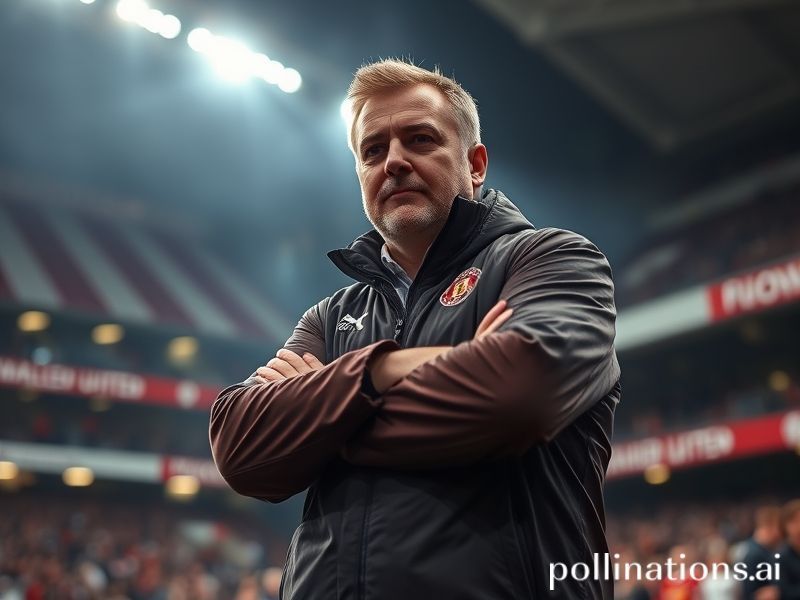Re-Appointed Chris Wilder: Sheffield United’s Global Time-Loop of Hope and Folly
The Curious Case of Chris Wilder and the Sheffield United Re-Hitch: A Parable for Our Global Age
Somewhere between the former steel mills and the artisanal oat-milk cafés of South Yorkshire, a football club has performed the managerial equivalent of drunk-texting an ex at 3 a.m. Sheffield United, relegated, bruised, and still smelling faintly of Championship turf, have reappointed Chris Wilder— the very man they elbowed out three years ago when the Premier League’s chandeliers began to rattle. The international observer, nursing jet-lag and a lukewarm airport flat white, can’t help but notice how neatly this romantic relapse mirrors the broader planetary pattern of repeating our worst mistakes with ever shinier PowerPoints.
From Buenos Aires boardrooms to Beijing betting apps, the Wilder Redux has been filed under “nostalgia as strategy,” a growth industry now worth more than nickel. United’s Saudi-backed owners—who, like everyone else in 2024, claim to be “pursuing holistic vertical integration”—have essentially concluded that the safest hedge against an uncertain future is the devil they already sacked. It’s the geopolitical equivalent of Washington re-hiring Henry Kissinger because, hey, at least he knows where the bodies are buried and the stationery cupboard is.
Wilder’s first stint delivered promotion, overlapping centre-backs, and the sort of manic intensity that made Brexit negotiations look genteel. Yet the global takeaway is darker: modern football clubs, like modern nation-states, have forgotten how to build. They can only oscillate—boom, bust, rinse, repeat—while telling themselves the next swing will somehow break the pendulum. The Blades’ squad is now a UN peacekeeping force of loan rangers and last-chance salooners; their finances are an M.C. Escher staircase of “parachute payments” that never quite land. If that sounds familiar, check the latest IMF outlook on emerging markets.
Still, Wilder’s return carries a whiff of artisanal authenticity in an age of algorithmic everything. He still drives a Mini Cooper, still refers to the stadium as “my gaff,” still looks like he’s on first-name terms with the apocalypse. For fans from Jakarta to Johannesburg who’ve watched their own local teams swallowed by hedge funds or sovereign wealth, there’s a perverse comfort in seeing a 56-year-old Yorkshireman handed the keys again. It’s the sporting equivalent of a vinyl revival— except the grooves are debt and the B-side is probably administration.
International scouts report that Wilder’s tactical reboot— “gegenpressing with a Northern accent”—is already trending on TikTok in Seoul, where kids recreate the overlapping centre-back routine using traffic cones and a lingering sense of economic precarity. Meanwhile, Premier League marketing departments are salivating at the prospect of a newly promoted Sheffield United providing the sort of underdog narrative that sells £95 retro shirts in Singapore. The cynic notes that underdog is simply oligarch for “smaller profit margin.”
Yet the broader significance, if we may be momentarily earnest, lies in what this says about institutional memory. In a decade when Twitter archives disappear, governments rewrite pandemic timelines, and Netflix cancels your favourite show mid-season, Sheffield United have at least remembered who they are: a club that responds to existential dread by turning up the volume and charging the same brick wall again. It’s not progress, but it is continuity— which in 2024 counts as a radical act.
So as the Bramall Lane floodlights flicker on like weary eyelids, the world watches a cautionary tale told with tongue firmly in scarred cheek. Re-appointing Chris Wilder won’t solve structural inequality, climate change, or the fact that VAR still can’t spot an obvious handball. But for one small corner of England—and for the diaspora of ironic expats streaming illegal feeds in Lisbon laundromats—it offers the fleeting illusion that history can be rewound, mistakes un-made, and that maybe, just maybe, the second coming will have better set-pieces.
The planet keeps spinning toward whatever fresh abyss awaits, but tonight there is Yorkshire tea, there is familiar bile, and there is hope. God help us all.







